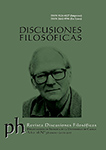Authors
Abstract
The purpose of this work is to place the doctrine of the scientifi c degrees of abstraction in the Renaissance discussion between Cajetan and Trombetta around the controversy about whether the being is fi rst thing in the intellect. According to Trombetta, the fi rst thing caught will be the species specialissima and not the being. To prove this, the Franciscan author will formulate a series of objections that will force Thomas de Vio to answer them in a new fi eld of discussion that will, to a certain extent, reform the understanding that had been held until that moment about the division of speculative sciences (mathematics, physics and metaphysics) by the Thomist way. Those who follow, and even those who criticize this classifi - cation, generally do not know or have not observed suffi ciently the context in which it was made. This fact is key to elucidate to what extent this theory is or is not faithful to Thomas Aquina´s thought.
Keywords:
References
Beuchot, Mauricio. “Escoto y Ockham, negadores de la distinción real esencia-existencia: la lucha interna entre el escotista Trombetta y el tomista Cayetano”. Cuadernos salmantinos de filosofía. 22, 1995: 175-182. Impreso
Braun, Bernhard. Ontische Metaphysik. Zur Aktualität der Thomasdeutung Cajetans. Königshausen: Neumann, Würzburg, 1995. Print
Cayetano, Tomas de Vio. Comentaria in De ente et essentia D. Thomae Aquinatis. Roma: Edición H. Laurent, Marietti, 1934. Print
___. Commentary on Being and Essence. Trans and. Intr. Kendzierski, Lottie, y Wade, Francis, Wis. Milwaukee: Marquette Univ. Press, 1964. Print
Cuccia, Emiliano Javier. “El problema tomístico de la abstracción. Una reconsideración en torno a la interpretación tradicional y sus limitaciones”. Cauriensia. Revista anual de Ciencias Eclesiásticas. 10 (2016): 245-263. Impreso
De Andrea, Miguel. “Soggeto e oggetto della metafisica secondo S. Tommaso”. Angelicum. 27 (1950): 165-195. Print
Derisi, Octavio. La doctrina de la inteligencia de Aristóteles a Santo Tomás. Club de Buenos Aires: Lectores, 1980. Impreso
De Tanoüarn, Guillaume. Cajétan. Le personnalisme integral. Paris: Les Éditions du cerf, 2009. Print
Dewan, Lawrence. Form and Being. Studies in Thomistic Metaphysics. Washington: The Catholic University of America Press, vol. 45, 2006. Print
Ferrari, Leo C. “A Thomistic Appraisal of Thomas de Vio Cajetan's 'Abstractio Totalis'” Angelicum. 42 (1965): 441-462. Print
García López, Jesús. “La abstracción según Santo Tomás”. Anuario filosófico.8 (1975): 207-221. Impreso
García-Villoslada, Ricardo. Martín Lutero. El fraile hambriento de Dios. Madrid: BAC, 1972. Impreso
Gredt, Iosephus. Elementa philosophiae Aristotelico-thomisticae. FriburgoBarcelona: Herder 1953. Print
Leroy, Marie-Vincent. “Le savoir spéculatif. Anexxe: abstractio et separatio d´aprés un texte controversé de saint Thomas”. Revue Thomiste. 48(1948): 236-327 y 328-339. Print
López Salgado, Cesáreo. “Abstractio y Separatio como Acceso a la Metafísica”. Sapientia19 (1964):102-116. Impreso
Manser, Gallus. La esencia del Tomismo, trad. García Yebra, Valentín. Madrid: CSIC, Instituto de Investigación Luis Vives de Filosofía, 1947. Impreso.
Mendoza, José. “La Epistemología tomista: un desvío de la originaria noción tomística de ciencia”. Ciencia Tomista. N° 140, 2013: 389-416. Impreso.
Muñoz, Ceferino P.D. “El ens en Cayetano: una aproximación a su significado e implicancias metafísicas”. Trans/Form/Ação, 36 (3), 2013: 23-34. Impreso.
Pascual, Rafael. La división de las ciencias especulativas en santo Tomás de Aquino. Roma: Excerpta ex dissertatione ad Doctorandum in Facultate Philosophiae Pontificiae Universitatis Gregorianae, 2003. Impreso.
Pinchard, Bruno. Métaphysique et sémantique, autour de Cajétan. Paris: Vrin, 1987. Print
Ponferrada, Gustavo. “Nota sobre los grados de abstracción”. Sapientia. 33 (1978): 267- 284. Impreso.
Ramírez, Santiago. “De ipsa philosophia in universum, secundum doctrinam aristotélico thomistica”. Madrid: Ciencia Tomista,1922. Impreso.
Reilly, John. Cajetan’s Notion of Existence. Mouton: The Hague, 1971. Print.
Riva, Franco. “Il Gaetano e l´ente come «primum cognitum»”. Rivista di Filosofia Neoescolastica, 85 (1), (1993): 3-20. Print.
Saranyana, Joseph-Ignasi. La filosofía medieval. Desde sus orígenes patrísticos hasta la Escolástica barroca. Pamplona: Eunsa, 2011. Impreso.
Simmons, Edward. “The thomistic doctrine of the three degrees of formal abstraction”. The Thomist. 22 (1959): 47-64.
Tomás de Aquino. El ente y la esencia. Trad., estudio preliminar y notas de Forment, Eudaldo. Pamplona: Eunsa, 2006. Impreso.
Van Riet, George. “La theorie Thomiste de l´ abstraction”. Revue Philosophique de Louvain. 50 (1952): 353-393. Print.
Vicente, Lorenzo. “Ontosemántica. En el umbral de la metafísica”. Aquinas 36 (1993): 125-159. Impreso.
___. “Abstracción formal y separación en la formación del ente metafísico”. Sapientia 59 (2004): 139-178. Impreso.
___. “¿Abstracción formal o separación? Desde Tomás de Aquino a Cayetano”. Estudios Filosóficos. 138 (1999): 211-256. Impreso.

 pdf (Español (España))
pdf (Español (España))
 FLIP
FLIP

























